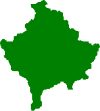| Revision as of 11:17, 1 September 2022 editAnomieBOT (talk | contribs)Bots6,562,667 editsm Substing templates: {{Cita noticia}}. See User:AnomieBOT/docs/TemplateSubster for info.Tag: Reverted← Previous edit | Latest revision as of 22:22, 23 September 2024 edit undoSadko (talk | contribs)Autopatrolled, Extended confirmed users, Rollbackers81,637 editsm Reverted edit by Bora28 (talk) to last version by BearcatTag: Rollback | ||
| (18 intermediate revisions by 14 users not shown) | |||
| Line 1: | Line 1: | ||
| {{Short description|none}} <!-- "none" is a legitimate description when the title is already adequate; see ] --> | |||
| ]]] | |||
| {{Culture of Kosovo}} | {{Culture of Kosovo}} | ||
| The ''' |
The '''culture of Kosovo''' refers to the culture of ]. It encompasses the ], ], ], visual arts, ], ], ]s and ] of Kosovo. Because of its ] and ], it represents a blend of different ]s especially of the western and eastern culture. | ||
| The ] of Kosovo has undergone considerable changes over the last centuries, one of the most notable being the increasing level of ].<ref>{{cite web|title=Freedom of Thought 2014 report (map)|url=http://freethoughtreport.com/map/|publisher=Freedom of Thought|access-date=2018-02-10|archive-url=https://web.archive.org/web/20171010131440/http://freethoughtreport.com/map/|archive-date=2017-10-10|url-status=dead}}</ref> The national identity revolves more around the language and culture, than the religion.<ref>Judah, Tim. "Albanians." Kosovo: What Everyone Needs to Know. Oxford: Oxford UP, 2008.</ref> | The ] of Kosovo has undergone considerable changes over the last centuries, one of the most notable being the increasing level of ].<ref>{{cite web|title=Freedom of Thought 2014 report (map)|url=http://freethoughtreport.com/map/|publisher=Freedom of Thought|access-date=2018-02-10|archive-url=https://web.archive.org/web/20171010131440/http://freethoughtreport.com/map/|archive-date=2017-10-10|url-status=dead}}</ref> The national identity revolves more around the language and culture, than the religion.<ref>Judah, Tim. "Albanians." Kosovo: What Everyone Needs to Know. Oxford: Oxford UP, 2008.</ref> | ||
| Due to ] making up the majority of Kosovo's population, the culture tends to be Albanian with slight variations. | Due to ] making up the majority of Kosovo's population, the culture tends to be Albanian with slight variations. | ||
| According to a survey carried out in 2005 by the Kosovo Statistics Office.<ref>{{cita web|url=http://www.ks-gov.net/esk/esk/pdf/english/general/kosovo_figures_05.pdf|urlarchivo=https://web.archive.org/web/20080309073836/http://www.ks-gov.net/esk/esk/pdf/english/general/kosovo_figures_05.pdf|fechaarchivo=9 de marzo de 2008|formato=PDF|título=Kosovo in figures 2005|autor=UNMIK|editorial=Ministry of Public Services}}</ref><ref>{{cite news |title=Muslims in Europe: Country guide|url=http://news.bbc.co.uk/2/hi/europe/4385768.stm|author=BBC News|date=23 December 2005|access-date=24 July 2009}}</ref><ref>{{cite news |title=churchesRegions and territories: Kosovo|url=http://news.bbc.co.uk/2/hi/europe/country_profiles/3524092.stm|author=BBC News|date=20 November 2007|access-date=24 July 2009}}</ref> The total population of Kosovo is between 1.9 to 2.2 million inhabitants with the following ethnic composition: Albanians 92%, Serbs 4%, Bosnians and Galanios 2%, Turks 1%, Rome 1%. The CIA World Factbook estimates the following percentages: 88% Albanians, 8% Serbs of Kosovo and 4% of other ethnic groups.<ref><!-- {{Wayback|url=https://www.cia.gov/library/publications/the-world-factbook/geos/kv.html |date=20080306223735 }} --></ref> According to the most recent CIA The World Factbook in July 2009, the population of Kosovo is 1,804,838 inhabitants. With an ethnic composition of "Albanians 88%, Serbs 7%, another 5%(Bosnios, Gorani, Rome, Turk, Ashkali, Egyptians, Janjevci - Croatas)".<ref>{{cita web|url=https://www.cia.gov/library/publications/the-world-factbook/geos/kv.html#People|título=World Factbook|autor=CIA|editorial=CIA|fechaacceso=24 de julio de 2009}}</ref> | |||
| == See also == | == See also == | ||
| Line 15: | Line 15: | ||
| *] | *] | ||
| * ] | * ] | ||
| * ] | |||
| * ] | * ] | ||
| ==Annotations== | |||
| {{notes | |||
| | notes = | |||
| {{efn | |||
| | name = status | |||
| | {{Kosovo-note}} | |||
| }} | |||
| }} | |||
| ==References== | ==References== | ||
| Line 32: | Line 22: | ||
| {{Culture of Europe}} | {{Culture of Europe}} | ||
| ] | |||
| ] | |||
| ] | |||
| ] | |||
| {{Kosovo-stub}} | {{Kosovo-stub}} | ||
| {{culture-stub}} | {{Europe-culture-stub}} | ||
Latest revision as of 22:22, 23 September 2024

| Part of a series on the |
| Culture of Kosovo |
|---|
 |
| History |
| People |
| Languages |
| Mythology and folklore |
| Cuisine |
| Festivals |
| Religion |
| Art |
| Literature |
| Music |
| Media |
| Sport |
| Monuments |
| Symbols |
The culture of Kosovo refers to the culture of Kosovo. It encompasses the ancient heritage, architecture, literature, visual arts, music, cinema, sports and cuisine of Kosovo. Because of its history and geography, it represents a blend of different cultural spheres especially of the western and eastern culture.
The society of Kosovo has undergone considerable changes over the last centuries, one of the most notable being the increasing level of secularity. The national identity revolves more around the language and culture, than the religion.
Due to Albanians making up the majority of Kosovo's population, the culture tends to be Albanian with slight variations.
See also
- Cultural Heritage of Kosovo
- Architecture of Kosovo
- Literature of Kosovo
- Culture of Kosovo Serbs
- Culture of Albania
- Culture of the Western Balkans (disambiguation)
References
- "Freedom of Thought 2014 report (map)". Freedom of Thought. Archived from the original on 2017-10-10. Retrieved 2018-02-10.
- Judah, Tim. "Albanians." Kosovo: What Everyone Needs to Know. Oxford: Oxford UP, 2008.
| Culture of Europe | |
|---|---|
| Sovereign states |
|
| States with limited recognition | |
| Dependencies and other entities | |
| Other entities | |
This Kosovo-related article is a stub. You can help Misplaced Pages by expanding it. |
This article about European culture is a stub. You can help Misplaced Pages by expanding it. |